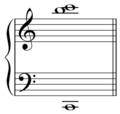Semitone facts for kids
A semitone is the smallest musical distance between two notes in Western music. You might also hear it called a half step or half tone. It's the shortest jump you can make from one note to the very next one in pitch.
Think of it like this: if you go from a note to the note right next to it, that's a semitone.
A whole tone is a bigger jump. It means moving two semitones. So, if you go from one note, skip the next one, and land on the one after that, you've moved a whole tone.
It's easiest to understand this on a keyboard.
Contents
Understanding Semitones on a Keyboard
On a piano or keyboard, the distance between two notes can be seen clearly.
- If you go from a white key to the black key right next to it, that's a semitone.
- If you go from a black key to the white key right next to it, that's also a semitone.
- Sometimes, two white keys are right next to each other with no black key in between (like E to F, or B to C). The distance between these white keys is also a semitone.
Semitones and Whole Tones in Action
Let's look at some examples using the note C:
- To go from a C note to a C sharp (C#) is one semitone.
- To go from a C sharp (C#) to a D note is another semitone.
- If you go straight from a C note to a D note, you've moved two semitones. This is a whole tone!
The Octave and Semitones
An octave is a special musical distance. It's when you go from one note (like C) all the way up to the next note with the same name (the next C). An octave is always divided into exactly twelve semitones. These twelve semitones are all the same size.
More to Explore in Music
Images for kids
-
Franz Liszt's second Transcendental Étude, measure 63
-
16:15 diatonic semitone
See also
 In Spanish: Semitono para niños
In Spanish: Semitono para niños
 | Chris Smalls |
 | Fred Hampton |
 | Ralph Abernathy |





